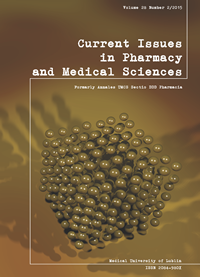Regulation of the genes involved in neurotransmission in Attention Deficit/Hyperactivity Disorder
DOI:
https://doi.org/10.1515/cipms-2015-0056Keywords:
genetics, candidate gene studies, pharmacogenetics, methylophenidate, serotonin, dopamine, ADHD, DRD, DAT, 5HT2AAbstract
Attention Deficit Hyperactivity Disorder is the full name of the disease commonly deemed ADHD. This disease is most frequently diagnosed in childhood, and it affects up to 12 % of all children world-wide. The current clinical criteria (the base for diagnosis) can be found in DSM -V. The core symptoms are divided in three groups: hyperactivity, impulsivity and impaired attention. The aetiology of the disorder is combined, including a wide range of factors, and the genetic, environmental, toxic, perinatal background is taken into account. Because, currently, more and more studies are seeking to explore the heritability of the disorder, the aim of this study is to review the information provided by different research centres which discuss the genetic background of the disease. Herein, we present the results of different studies gathered from the online database. Our findings indicate that the participation of genetic factors within this disorder is supported by family, twin and adoption studies. Indeed, in current literature, researchers estimate that there is a higher risk of developing ADHD among children from families with an ADHD history. Of particular note is that there are some studies indicating particular genes that determine the susceptibility to ADHD. Such studies make mention that most of these genes encode components of the dompaminergic and serotoninergic neurotransmission systems. Researchers in the field, thus, are attempting to link the presence of certain alleles in affected children with their response to treatment. Yet, while ADHD is now considered as being a disorder of genetic background, we cannot indicate a single gene or its mutation that would be crucial in the aetiology and diagnosis. Still, a number of candidate genes have been reported so far.References
1. Baehne, C.G. et al.: Tph2 gene variants modulate response control processes in adult ADHD patients and healthy individuals. Mol. Psychiatry, 14, 1032-1039, 2009.
2. Banaschewski, T. et al.: Molecular genetics of attention-deficit/ hyperactivity disorder: an overview. Eur. Child Adolesc. Psychiatry, 19, 237-257, 2010.
3. Dey, S., Rao, A.R. and Shah, M.: Exploiting the brain’s network structure in identifying ADHD subjects. Frontiers in system neuroscience, 6 (2012), http://journal.frontiersin.org/article/10.3389/fnsys.2012.00075/abstract.
4. DeYoung C.G. et al.: Tremblay, R.E., Kennedy, J.L. and Palmour, R.M. The Dopamine D4 Receptor Gene and Moderation of the Association Between Externalizing Behavior and IQ. Arch. Gen. Psychiatry, 63, 1410-1416, 2006.
5. http://www.cdc.gov/ncbddd/adhd/diagnosis.html
6. http://www.drthomasebrown.com/dsm-5-changes-in-adhddiagnostic-criteria/
8. Kebir O. et al.: Candidate genes and neuropsychological phenotypes in children with ADHD: review of association studies. J. Psychiatry Neurosci., 34, 88-101.1, 2009.
9. Kustanovich V. et al.: Transmission disequilibrium testing of dopamine-related candidate gene polymorphisms in ADHD: confirmation of association of ADHD with DRD4 and DRD5. Mol. Psychiatry, 9, 711-717, 2004.
10. Levy F.: What do dopamine transporter and catechol-omethyltransferase tell us about attention deficit hyperactivity disorder? Pharmacogenomic implications. Aust. N. Z. J. Psychiatry, 41, 10-16, 2007.
11. Levy F., Barr C., Sunohara G.: Directions of etiologic research on attention deficit hyperactivity disorder. Aust. N. Z. J. Psychiatry, 32, 97-103, 1998.
12. Lowe N., Barry E., Gill M., Hawi, Z.: An Overview of the Pharmacogenetics and Molecular, Genetics of ADHD. Current Pharmacogenomics, 4, 231-243, 2006.
13. Madras B. K., Miller G.M., Fischman A.J.: The Dopamine Transporter and Attention-Deficit/Hyperactivity Disorder. Biol. Psychiatry. 57, 1397-1409, 2005.
14. Ribases M.et al.: Exploration of 19 serotoninergic candidate genes in adults and children with attention-deficit/hyperactivity disorder identifies association for 5HT2A, DDC and MAOB. Mol. Psychiatry, 14, 71-85, 2009.
15. Steinhausen H.C.: The heterogeneity of causes and courses of attention-deficit ⁄hyperactivity disorder, Acta Psychiatr. Scand., 120, 392-399, 2009.
16. Stahl S.M.: Leki stabilizujące nastroj, Asteria, Gdańsk, 17, 25-40, 2010.
17. Takon I.: Clinical use of a modified release methylphenidate in the treatment of childhood attention deficit hyperactivity disorder. Annals of General Psychiatry 10 (2011), http://www.annals-generalpsychiatry.com/content/10/1/25
18. Xu X. et al.: Association study between a polymorphism at the 3’-untranslated region of CLOCK gene and attention deficit hyperactivity disorder. Behavioral and Brain Functions, 6 (2010), [http://www.behavioralandbrainfunctions.com/content/6/1/48].
Downloads
Published
Issue
Section
License
Copyright (c) 2015 Autorzy

This work is licensed under a Creative Commons Attribution-NonCommercial-NoDerivatives 3.0 Unported License.


